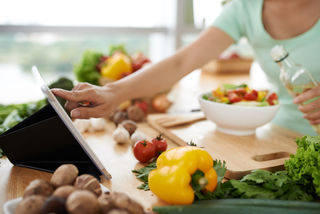Anxiety
How to Feel More Confident About Cooking at Home
Banish self-doubt and anxiety in the kitchen—even if you’re a novice cook.
Posted June 17, 2019

Cooking at home is a great way to take control of both your diet and your wallet. If you’re trying to cook more frequently these days, you’re not alone. In a survey by Peapod, 43 percent of Americans said they plan to cook more often in 2019. Meanwhile, meal kit subscriptions and grocery home delivery services continue to flourish.
Yet good intentions to cook healthy meals at home don’t always translate into actions. One big hurdle for some people is getting past the belief that they “can’t cook.”
The younger you are, the more likely it is that you’ll doubt yourself in the kitchen, according to a survey by Porch. Among the survey’s 750 respondents, 24 percent of baby boomers, 29 percent of gen xers, and 35 percent of millennials rated themselves as less-than-good cooks. Some seemed to have a remarkably low opinion of their own cooking skills; 17 percent of millennials claimed they couldn’t make a salad, for example.
If you consider yourself inexperienced or inept in the kitchen, there are cooking shows, videos, apps, blogs, and books galore that offer basic, step-by-step instructions for preparing easy dishes. But they don’t necessarily address a lack of cooking self-efficacy—belief in your ability to make tasty and nutritious meals.
For that, you need cooking-specific, confidence-building strategies. Recently, I had a chance to discuss such strategies with three mental health professionals. Below are some of the practical tips they shared, along with a few thoughts of my own.
Begin with a mindful trip to the grocery store.
Being mindful involves noticing and accepting your moment-to-moment experiences, thoughts, and feelings—and then letting them go as you move on to the next moment. Incorporating mindfulness into your cooking routine helps you acknowledge negative thoughts (“I can’t do this!”) without getting stuck on them.
Start at the supermarket, suggests Jaclyn Lopez Witmer, Psy.D., a licensed clinical psychologist in New York. “Give yourself plenty of time to shop,” Witmer says. “As you walk through the aisles, focus your awareness on the present moment as well as the space you’re moving in. Be patient with yourself and remind yourself that it’s okay to have trouble finding something or feel unsure about how much to buy.” Over time, you’ll build confidence in your food selection skills, just as you do in your cooking skills.
Invite mindfulness into your kitchen as you cook.
Once you get home with your grocery bags, mindfulness can help manage anxiety and stress as you go about preparing the food. When you bring mindfulness into your kitchen, you’re focused on what’s happening in the moment—the veggies you’re chopping, the batter you’re beating, the sauce you’re stirring—rather than obsessing over how the dish will turn out or worrying about other things you need to do.
“Breathe and watch what you’re doing,” says Denver psychotherapist Brittany Bouffard, LCSW. “Of course, if the pan is on fire, put it out. But otherwise, be aware of your movements and notice your thoughts and sensations. Allow yourself to get curious about the smells and colors as well as how the ingredients change as they combine.”
Cater to your learning style when trying new recipes.
Set yourself up for success by choosing the best recipe format for you. “Consider whether you’re more of a visual or auditory learner: do you need to see the recipe in front of you or do you need to hear someone describing each step while you work?” says Lopez Witmer. “A strengths-based approach to learning can improve your self-confidence. Also, being aware of your learning style and how you process new information can help ease anxiety and promote inner calmness as you navigate a new task, such as cooking something new.”
Know what to do if cooking stirs up difficult feelings.
Inevitably, there will be times when you start feeling flustered or frustrated. “When you notice a negative feeling, name it,” Bouffard says. “You might tell yourself, ‘A part of me is frustrated or impatient or moving too fast.’”
The trick is to acknowledge such feelings without letting them hijack your attention. To refocus on the cooking itself, Bouffard suggests that you start out by taking a few deep breaths and guiding your awareness to how your feet feel standing on the kitchen floor. Once you’re feeling calmer, Bouffard offers this advice: “If new negative, unhelpful thoughts arise, simply note them as thoughts and let them chatter only on the sidelines. Then bring your attention back to the colors, the smells, the temperature, the repetition of cutting or stirring.”
Realize that occasional recipe fails are to be expected.
If you’re a novice cook, you may want to postpone your gourmet goals and aim for edible at first—and, even then, some of your early cooking attempts may fall short of the bar. “You are likely to be less frustrated if you treat cooking disasters as part of the experience,” says Ana Jovanovic, M.S., psychologist and life coach at Parenting Pod. “We learn through trial and error. Don’t expect yourself to naturally do everything flawlessly, even though other people may think of cooking as easy. Beginnings tend to be a bit difficult.”
Jovanovic says that finding humor in the situation helps foster cooking resilience—the ability to cope with challenges and bounce back from disappointments in the kitchen. “Though messing up a meal may be frustrating, try to find the strength to laugh it out,” she says. “We learn through mistakes. Especially the ones that leave us with a messy kitchen and nothing to eat!”
Keep a pressure cooker mindset out of the kitchen.
“Don’t rush,” advises Jovanovic. “Time pressure adds to the stress of trying something new. Sometimes it’s better to stick to something you already have on hand or to order in food rather than stress over the meal you were planning to cook.”




